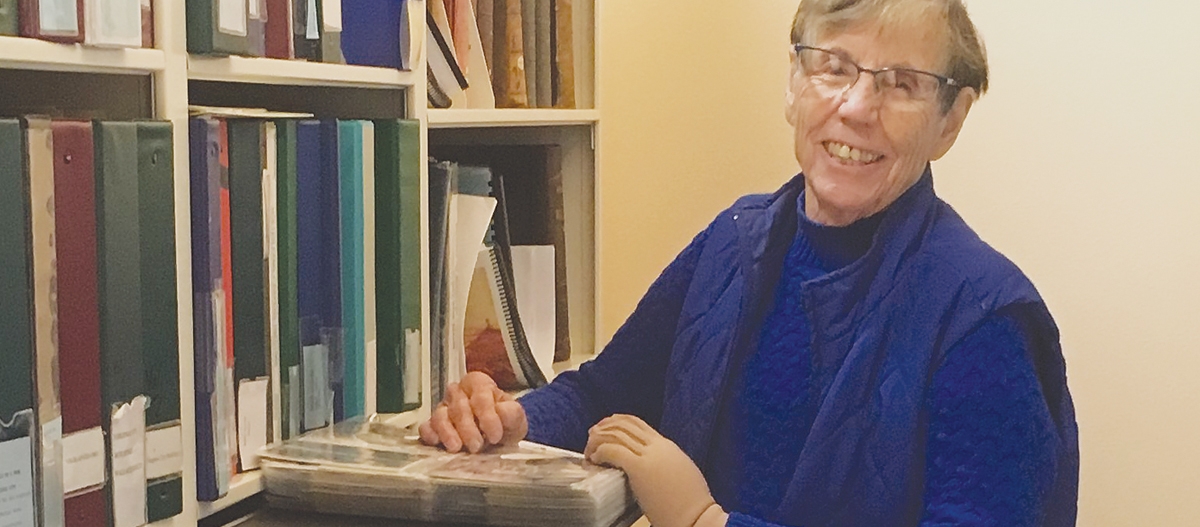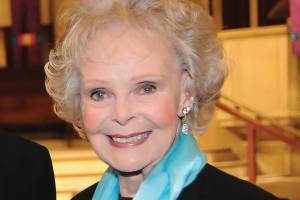By SUZANNE WARING
If you could choose to grow up immersed in early Montana history, you might pick Virginia City as your hometown. But wait, when we think of Virginia City, we think of a tourist town with the sole purpose of telling the story of one of Montana’s first settlements.
Do people actually live there, or are the people seen on the streets transients who stop in for temporary employment or to visit during the summer tourist season?
Unlike other towns that tell an historical story, Virginia City has been a living, working community since its beginning. It continues to be the county seat for Madison County. As a community of permanent residents, it offers the amenities of a small Montana town, such as a post office, community building, and churches.
Evalyn Batten Johnson, 82, makes her home in this historical town. She grew up in Virginia City, went to high school there, and lives there year around.
An Early Love of History
Johnson was 3 years old when her family moved to Virginia City from California in 1936 and rented the rustic Kramer building for their living quarters. It offered no conveniences for them except walls and a roof over their head.
Her father was a miner and had a claim not far from town. Her mother took in laundry and did ironing. She also cleaned houses. Evalyn and her brother, Bill, had the run of the town.
“Because I was fascinated with the old buildings, I often went inside them,” said Johnson. “Left behind in these buildings were artifacts and papers. The papers didn’t interest me then. Now I wonder what information I might have gleaned from them.”
In the early 1940s, Charley and Sue Bovey became interested in saving the town for historical purposes. One of the first buildings that they purchased was the Kramer building. The Battens had to move, so they rented a large house that had once been a hospital. During this period of Johnson’s youth, her father died from what they called “miner’s con,” a name for a respiratory disease that miners often had. Mrs. Batten couldn’t afford the rent on this large building, so the Battens had to move again.
This time they purchased a tiny house on Idaho Street and lived there many years. To save money for college, Evalyn worked in the summers at eateries when she was a teenager. One summer she washed dishes, and for two summers she was a short-order fry cook. Later Evalyn’s mother bought the larger house next door, and that is where Johnson lives today.
Education
After graduating from high school, Johnson first went to Carroll College to become a nurse. She decided that wasn’t what she wanted to do, so she transferred to Western Montana College and earned a two-year degree to teach.
She taught a year in Thompson Falls and then decided she needed more education, so she attended the University of Montana to earn a baccalaureate degree. She met Dick Johnson, who was also a U of M student. They were married after they graduated from college.
Dick made a career of working for the Bureau of Land Management, and they lived in several states while he fulfilled different assignments. When they were living in the state of Virginia, Evalyn was a volunteer at the library where they were archiving Actor Orson Wells’ papers and pictures. She became a helper and learned skills for archiving.
For their vacation the couple would always return to Virginia City where Evalyn kept her mother’s home after her mother died. They decided that they would retire there.
Once back home, Johnson volunteered. “I have enjoyed being a member of the community,” she said. She has been a member of the cemetery board, the preservation alliance, and the library board.
Volunteering to Archive
In 1997 when she was on the library board, the library received boxes and boxes of papers after resident and local historian Dick Pace passed away. When she saw those boxes, she remembered her experiences with archiving the Orson Wells papers and said, “I can do this.”
With the help of Faye Rutherford, assistant librarian, Johnson spent the next five years reading Dick Pace’s handwritten work and cataloging it within acid-free sleeves in binders according to topic. After that she filled a file cabinet with two indices: one index of names filed alphabetically and the other index of occupations with associated names.
Now that the archiving is mostly finished, she works long hours in the summers, researching for people who write, call, or come into the Thompson-Hickman County Library to find out about ancestors who lived in or around Virginia City. In addition to the archives, she uses old copies of both the Virginia City Madisonian or the Butte Standard to do the research.
Penning History
In 2008 Johnson, along with Joanne Erdall, wrote a book titled, Images of America: Virginia City. “It is a picture book of the town,” Johnson said. “People can pour over it before they come to Virginia City to acquaint themselves with the history of what they are going to see, or they can take it along as they walk through the town.” Proceeds from the book go toward library projects. It is available for $21.99 plus postage through the Thompson-Hickman County Library, 217 Idaho Street, Virginia City, MT 59755 or online through Arcadia Press.
So, it’s not going to work out for you to move to Virginia City. Well, maybe you can visit. When you do, stop by the Thompson-Hickman Library with your questions. If Evalyn doesn’t know the answers, she likely will know where to find them.
Embracing her love for Virginia City that blossomed when she was a young girl rummaging through the old buildings, Evalyn Batten Johnson continues her investigative journey of the town’s history. — MSN








